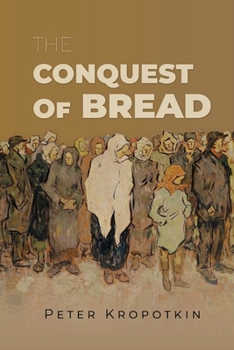The Conquest of Bread
"Well-being for all is not a dream-it is possible, it is realizable." - Peter Kropotkin, The Conquest of Bread
First published in 1892, The Conquest of Bread is one of the foundational texts of anarchist political philosophy. Written by the Russian revolutionary and scientist Peter Kropotkin, the book presents both a critique of the inequalities produced by capitalism and a vision for a cooperative society based on mutual aid, decentralization, and voluntary association.
Kropotkin argues that the means of production, technological advancement, and the natural abundance of resources make it possible to secure a dignified standard of living for all. Rather than emphasizing struggle and competition, his proposals highlight cooperation, local organization, and the collective management of resources.
This work has influenced generations of activists, political thinkers, and social movements seeking alternatives to capitalism and authoritarianism. For students of political theory, history, economics, and philosophy, The Conquest of Bread remains a key primary source for understanding the development of anarchist thought and the continuing debates around social justice, equality, and economic freedom.





